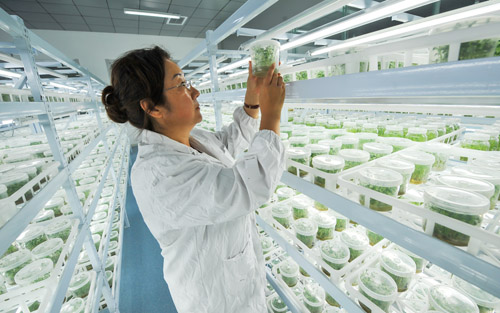| TV Host Questioned
 |
|
(FILE) |
Wang Gang, a Chinese actor who hosts an antique program on TV, incurred a wave of criticism recently for allegedly smashing authentic treasures. In the show, appraisers determine whether antiques brought by collectors are genuine or fake. Those deemed fake are then theatrically smashed by Wang, though some pieces were later claimed by a few appraisers to be real.
In May, the Capital Museum in Beijing put on an exhibition of around 40 genuine porcelains and more than 30 forgeries smashed into pieces by Wang in the program so that collectors could make a comparison between the genuine ones and forgeries. However, some collectors who attended the exhibition found that the forgeries were authentic artworks.
Producers of the program denied that Wang destroyed any authentic pieces. The Beijing Municipal Administration of Cultural Relics announced on August 21 that after careful examination, they found the porcelains broken by Wang were fakes.
 |
|
HOT POTATO A technician inspects potato seedlings in a laboratory in Dingbian County, northwest China's Shaanxi Province on August 21. Dingbian has become the country's main potato growing region (LIU XIAO) |
Stock Incentive
The country's securities regulator said on August 19 that it will launch the employee stock ownership plan for listed companies at a later time after further improving the draft regulation.
China Securities Regulatory Commission said that it is reviewing feedback on the draft regulation on the shareholding scheme, which was issued to solicit public opinion on August 5.
The plan, which allows listed firms to buy their own stocks on the secondary market through an assets management agency with a designated portion of their employees' cash compensation, is aimed at allowing more staff to benefit from stock ownership.
Employees of listed companies can participate in the plan on a voluntary basis and be entitled to shares according to a distribution agreement.
The employee stock ownership plan, which will help increase the efficiency and comprehensive strength of a listed company, is a widely employed mechanism in mature securities markets. China had previously introduced plans that encouraged only senior executives to own stakes in listed companies.
Home Price Rebound
More Chinese cities saw home prices rise in July over June, as signs of warming have emerged in China's property market after local governments relaxed property curbs in the wake of weakening economies.
In July, 50 cities—up from 25 in June—out of a statistical pool of 70 major cities, recorded higher new home prices than a month earlier, the National Bureau of Statistics (NBS) said.
Only nine cities saw declines in new home prices in July, down from 21 in June, while prices in 11 cities remained unchanged.
Encouraged by rising transactions in recent months, some developers have started to raise prices or cancel discounts.
"It's still a little early to determine whether this momentum will be sustained," said Mark Budden, China Area Leader at EC Harris, a leading global built asset consultancy.
Corporate Profits Down
China's economic slowdown has impacted the country's corporate profits, as listed companies' profit growth largely contracted in the first half of the year.
As of August 17, 1,003 companies listed on the Shanghai Stock Exchange or Shenzhen Stock Exchange posted a combined first-half net profit of 180.21 billion yuan ($28.38 billion), up 6.75 percent year on year, China Securities Journal reported.
The growth figure took a major tumble compared to that reported on the same day last year, as the semiannual net profits of all 1,096 listed companies in 2011 surged 36.14 percent from last year.
Industrial sectors such as steel, construction and building materials have fared the worst, affected by the tightening grip over the real estate industry and cooling investment enthusiasm.
Banking Malaise
China's biggest banks still dominate the world's top 10 in terms of market capitalization and are among the most profitable globally, according to a report by Boston Consulting Group.
But their falling valuation multiples suggest declining investor confidence in their future profitability.
Driven by rapid growth in credit spreads, the big four state-owned banks were among the world's top banks, with the Industrial and Commercial Bank of China maintaining the top spot.
Chinese banks had an average of 22 percent after-tax return on equity, second only to Indonesia.
However, Boston Consulting suggested that the high profitability of Chinese banks was unlikely to be continue indefinitely.
"Clearly there is a lack of faith in China's economy, and in the level of hidden losses or likely potential losses," said Ranu Dayal, a senior partner of Boston Consulting and co-author of the report. "Better transparency will likely increase investor confidence, which should lead to an improvement in valuation," said Dayal.
Wine Import Probe
A number of wine producers have applied to the Ministry of Commerce demanding investigations into European imports, now being accused of damaging the domestic wine market.
EU wine imports surged to 169,114 kiloliters, in 2011, from 35,944 kiloliters, in 2008, at an annual pace of 67.71 percent. In the past four years, its market share in China increased from 4.94 percent to 14.76 percent, Wang said.
The EU has provided various subsidies to the wine industry, putting Chinese makers at a disadvantage, said Wang Zuming, head of the wine division of the China Alcoholic Drinks Association.
The EU is the world's largest wine-producing region. Its production capacity and export potential will only have a negative impact on winemakers in China, said Wang. | 